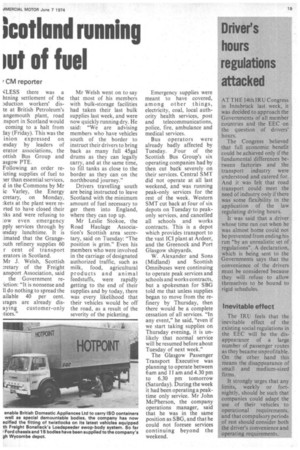kotIond running Put of fuel
Page 21

If you've noticed an error in this article please click here to report it so we can fix it.
CM reporter
4LESS there was a htning settlement of the Auction workers' diste at British Petroleum's angemouth plant, road risport in Scotland would coming to a halt from iay (Friday). This was the inion expressed on lesday by leaders of erator associations, the ottish Bus Group and asgow PTE.
Following an order reicting supplies of fuel to ler than essential services, d in the Commons by Mr ic Varley, the Energy cretary, on Monday, ;kets at the plant were rerted to have closed their lks and were refusing to [ow even emergency pply services through by iesday lunchtime. It is imated that the Grangeauth refinery supplies 60 r cent of transport erators in Scotland.
Mr J. Welsh, Scottish -:retary of the Freight ansport Association, said the Government reiction: "It is nonsense and 11 do nothing to spread the ailable 40 per cent. 'rages are already dis aying customer-only .tices." Mr Welsh went on to say that most of his members with bulk-storage facilities had taken their last bulk supplies last week, and were now quickly running dry. He said: "We are advising members who have vehicles south of the border to instruct their drivers to bring back as many full 45ga1 drums as they can legally carry, and at the same time, to fill tanks as close to the border as they can on the northbound journey." Drivers travelling south are being instructed to leave Scotland with the minimum amount of fuel necessary to ger them into England, where they can top up. Mr Leslie Stokoe, the Road Haulage Association's Scottish area secretary, said on Tuesday: "The position is grim." Even his members who were involved in the carriage of designated authorized traffic, such as milk, food, agricultural products and animal feedstuffs, were rapidly getting to the end of their supplies and by today, there was every likelihood that their vehicles would be off the road, as a result of the severity of the picketing. Emergency supplies were meant to have covered, among other things, electricity, coal, local authority health services, post and telecommunications, police, fire, ambulance and medical services.
Bus operators were already badly affected by Tuesday. Tour of the Scottish Bus Group's six operating companies had by then cut back severely on their services. Central SMT did not operate at all last weekend, and was running peak-only services for the rest of the week. Western SMT cut back at four of six depots on Tuesday to peakonly services, and cancelled all schools and works contracts. This is a depot which provides transport to the vast ICI plant at Ardeer, and the Greenock and Port Glasgow shipyards. W. Alexander and Sons (Midland) and Scottish Omnibuses were continuing to operate peak services and schools and works contracts, but a spokesman for SBG told me that unless supplies began to move from the refinery by Thursday, then there would be a complete cessation of all services. "In any event," he said, "even if we start taking supplies on Thursday evening, it is unlikely that normal service will be resumed before about Tuesday of next week." The Glasgow Passenger Transport Executive was planning to operate between 6am and Ham am and 4.30 pm to 6.30 pm tomorrow (Saturday). During the week it had been operating a peaktime only service. Mr John McPherson, the company operations manager, said that he was in the same position as SBG, and that he could not foresee services continuing beyond the weekend.




























































































































































